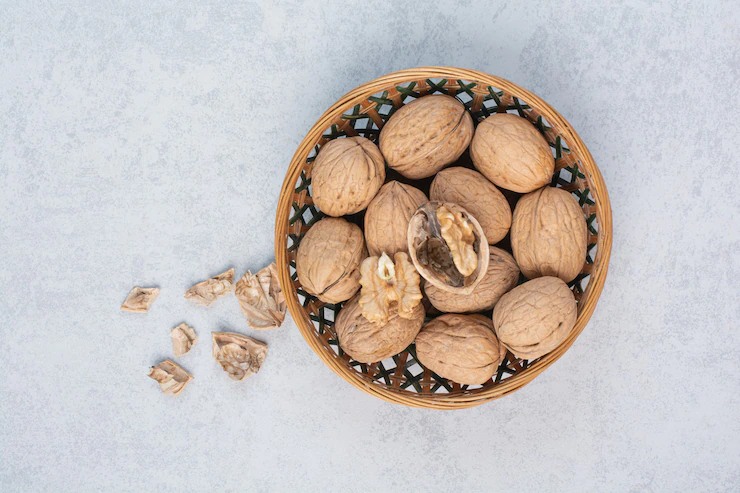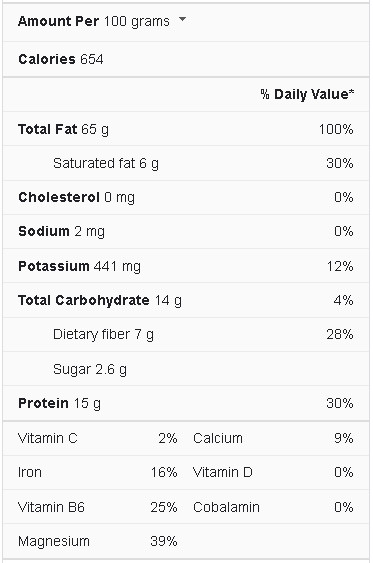Walnuts (Juglans regia) are a tree nut from the Juglans family. They are believed to have originated in the Mediterranean and Central Asia and consumed by humans for thousands of years. Compared to most other foods, these nuts are enriched in omega-3 fatty acids and antioxidants. Walnuts may help boost brain function and reduce the risk of heart disease and cancer. Walnuts are commonly consumed as a snack, but they can also be included in salads, pasta, cereals, soups, and baked goods. They’re also used to manufacture walnut oil, a high-end culinary oil popular in salad dressings.
Walnuts may be a healthy snack and a robust, tasty complement to various recipes, from baked products to savory entrees. Walnuts are high in polyunsaturated fat, a healthy lipid that can help heart health and other advantages. Walnuts come in various shapes and sizes, but English walnuts are the most prevalent.
What Are Walnuts?
Walnuts are single-seeded, spherical stone fruits produced by the walnut tree. They’re high in heart-healthy fats, protein, and fiber. They may improve heart and bone health and aid weight loss, among other things. Walnut trees are native to eastern North America, but they are also widely planted in China, Iran, California, and Arizona in the United States. A wrinkled, globe-shaped nut lies behind the husk of the walnut fruit. To be marketed commercially, the walnut is divided into two flat halves. Walnuts can be purchased raw or roasted, salted or unsalted. This article examines the nutritional value of walnuts and their potential health benefits.
Walnuts Nutrition Facts
Carbs
One hundred grams of walnuts only contains about 14 grams of carbohydrates, and a small amount is naturally occurring sugar (2.6g). Most of the carbohydrate in walnuts comes from healthy fiber.
Fats
Most of the calories in walnuts come from fat, and you’ll consume 65 grams of fat when you eat 100 grams of walnuts.
Protein
In addition to providing fiber and healthy fat, walnuts also provide a healthy protein boost. One hundred grams of walnut provides over 15 grams.
What Are The Health Benefits Of Walnuts?
It’s an understatement to say walnuts are a nutrient-dense food. Walnuts are high in healthy fats, fiber, vitamins, and minerals, and that’s only the start of how they can help you stay healthy. Indeed, there is so much interest in this one nut that academics and industry leaders have gathered at the University of California, Davis, every year for the past 50 years for a walnut conference to examine the newest walnut health research. The English walnut is the most popular and well-studied of the walnut varieties.
Here are some health benefits of walnuts that have been proven by science.
Rich in Antioxidants
Walnuts have more antioxidants than any other popular nut. Vitamin E, melatonin, and plant substances are known as polyphenols, which are particularly abundant in the papery skin of walnuts, and are responsible for this effect.
A small preliminary study in healthy adults found that having a walnut-rich lunch reduced oxidative damage of “bad” LDL cholesterol after eating, whereas eating a refined-fat meal did not. This is advantageous since oxidized LDL can form plaque in your arteries, resulting in atherosclerosis.
Super Plant Source Of Omega-3s
Walnuts have any nut’s highest omega-3 fat content, with 2.5 grams per 1-ounce (28-gram) serving. Alpha-linolenic acid is an omega-3 lipid found in plants, especially walnuts (ALA). It’s an essential fat, which means you must obtain it through your food.
The Institute of Medicine recommends that men and women consume 1.6 and 1.1 grams of ALA per day, respectively, and a single serving of walnuts satisfies this requirement. According to observational studies, each gram of ALA consumed each day reduces your risk of dying from heart disease by 10%.
May Decrease Inflammation
Many diseases, including heart disease, type 2 diabetes, Alzheimer’s disease, and cancer, are caused by inflammation, which can be triggered by oxidative stress. Walnut polyphenols may aid in the battle against oxidative damage and inflammation.
Ellagitannins, a subclass of polyphenols, maybe mainly involved. Beneficial bacteria in your gut convert ellagitannins into urolithins, which have been shown to help fight inflammation. Walnuts’ ALA omega-3 oil, magnesium, and the amino acid arginine may also help to reduce inflammation.
Promotes A Healthy Gut
According to studies, having a gut microbiota rich in health-promoting bacteria and other microorganisms (your gut microbiota) increases your chances of having a healthy gut and overall health. An unhealthy microbiota composition can cause inflammation and disease in your gut and other body parts, raising your risk of obesity, heart disease, and cancer.
What you consume has a significant impact on the composition of your microbiota. One method to boost the health of your microbiota and gut is to eat walnuts. When 194 healthy people consumed 1.5 ounces (43 grams) of walnuts every day for eight weeks, their beneficial bacteria increased compared to when they did not consume walnuts.
May Reduce Risk Of Some Cancers
According to test-tube, animal, and human observational studies, walnuts may reduce the risk of some cancers, including breast, prostate, and colorectal cancers. As previously mentioned, walnuts are high in polyphenol ellagitannins, and these can be converted to urolithins by specific intestinal bacteria.
Urolithins may have anti-inflammatory qualities in the gut, explaining why walnuts may help prevent colorectal cancer. The anti-inflammatory properties of urolithins may also assist in protecting against other malignancies. Urolithins also have hormone-like characteristics, allowing them to inhibit hormone receptors in your body. This may lower your chances of developing hormone-related malignancies, such as breast and prostate cancers.
Supports Weight Control
Walnuts are high in calories; however, studies show that their energy is 21% lower than predicted based on their components. Furthermore, walnuts may help you control your hunger. Drinking a smoothie made with around 1.75 ounces (48 grams) of walnuts once a day for five days reduced appetite and hunger in ten obese persons, compared to a placebo drink with the same calories and nutrients.
Brain scans revealed that after five days of ingesting the walnut smoothies, the participants’ activation in a brain region that helped them resist highly enticing food cues like cake and French fries had increased. Even though larger and longer-term studies are needed, this study provides preliminary insight into how walnuts may aid hunger and weight control.
May Help Manage Type 2 Diabetes and Lower Your Risk
According to observational studies, walnuts are associated with a lower incidence of type 2 diabetes since they help control weight. Excess weight raises your chances of developing diabetes and high blood sugar. On the other hand, Walnuts may help manage blood sugar through mechanisms unrelated to weight loss. In controlled research of 100 persons with type 2 diabetes, consuming one tablespoon of cold-pressed walnut oil daily for three months while taking their regular diabetes medication and eating a healthy diet resulted in an 8% reduction in fasting blood sugar.
Furthermore, walnut oil users experienced an 8% reduction in hemoglobin A1C. (3-month average blood sugar). The control group’s A1C and fasting blood sugar levels did not improve, and there was no difference in weight between the two groups.
May Help Lower Blood Pressure
Heart disease and stroke are linked to high blood pressure, and walnuts may help lower blood pressure in patients with high blood pressure and healthy stressed people. This impact was not observed in other investigations.
A Mediterranean diet supplemented with 1 ounce (28 grams) of mixed nuts daily, half of which were walnuts, was studied in the four-year PREDIMED research in nearly 7,500 adults at high risk of heart disease. At the end of the research, people on the nut-enriched Mediterranean diet had a 0.65 mmHg lower diastolic blood pressure (bottom number) than people on a similar heart-healthy control diet who weren’t given nuts.
Which Is Better For You, Cashews Or Walnuts?
Should you eat walnuts or cashews if you want a nutrient-dense, heart-healthy snack? Many individuals like to study the nutrition profile to pick the best foods to eat, so both of these nuts taste wonderful. When you compare the nutrition of walnuts and cashews, you’ll notice that they both contain a lot of health advantages.
While it’s vital to think about the macros and nutrients you’re getting from your meal, there’s no one-size-fits-all solution for picking the healthiest nut. Many nutrition experts suggest that eating a range of nuts, seeds, fruits, and vegetables is the most excellent method to obtain various vitamins and minerals.
Nature’s Garden is dedicated to delivering delicious, convenient food for your family.
Try our single-nut snacks or trail mixes to include walnuts and cashews in your healthy diet plan. Our healthy snack packs contain a range of nuts and seeds, providing the perfect balance of nutrients to help you achieve your health objectives.
Walnut vs. Cashew Benefits
Here are a few things you need to know when comparing walnut nutrition with cashew nutrition:
- Macronutrients: Many people like to track their consumption of calories, protein, fats, and carbs. While cashews are a little lower in calories, Cashews are higher in protein and lower in fat compared to walnuts.
- Micronutrients: Carbs, fat, and protein aren’t the only factors that affect your health, and it’s also essential to look at micronutrients such as vitamins and minerals that you get when eating these nuts. Walnuts are higher in many micronutrients such as vitamin E, omega-3s, manganese, and cashews and are higher in magnesium, zinc, iron, copper, and phosphorus.
- Tree Nut Allergies: One other factor that you need to consider is whether you have a walnut or cashew allergy. These nuts fall into the “tree nut” category, so you should steer clear if you know that you are allergic to tree nuts. Instead, you can choose from various other seeds and high-protein snacks to support your health.
What Are The Side Effects Of Eating Walnuts?
Here are some side effects also of eating walnuts:
- Walnuts are one of the top eight allergenic foods. Walnut allergies usually cause severe symptoms, including allergic shock (anaphylaxis), which can be fatal if not treated. If you have a walnut allergy, you must avoid them.
- Walnuts, like other seeds, are high in phytic acid. Phytic acid, also known as phytate, is a plant component that inhibits the absorption of minerals from the digestive tract, such as iron and zinc. This only applies to meals, including foods high in phytates.
- Mineral deficiencies are more likely in persons who eat an unbalanced diet high in phytic acid, but most people shouldn’t be concerned.
Although walnuts are nutritious, some people are allergic to them and must avoid them. Mineral absorption may be hampered by phytic acid, but this is usually not a problem for persons who consume a well-balanced diet.
Conclusion
Walnuts are abundant in antioxidants and heart-healthy lipids. Furthermore, eating walnuts daily may improve brain function and lower heart disease and cancer risks. These nuts are simple to incorporate into your diet because they may be eaten alone or combined with various dishes. Said, walnut consumption may be one of the most beneficial things you can do for your health.


